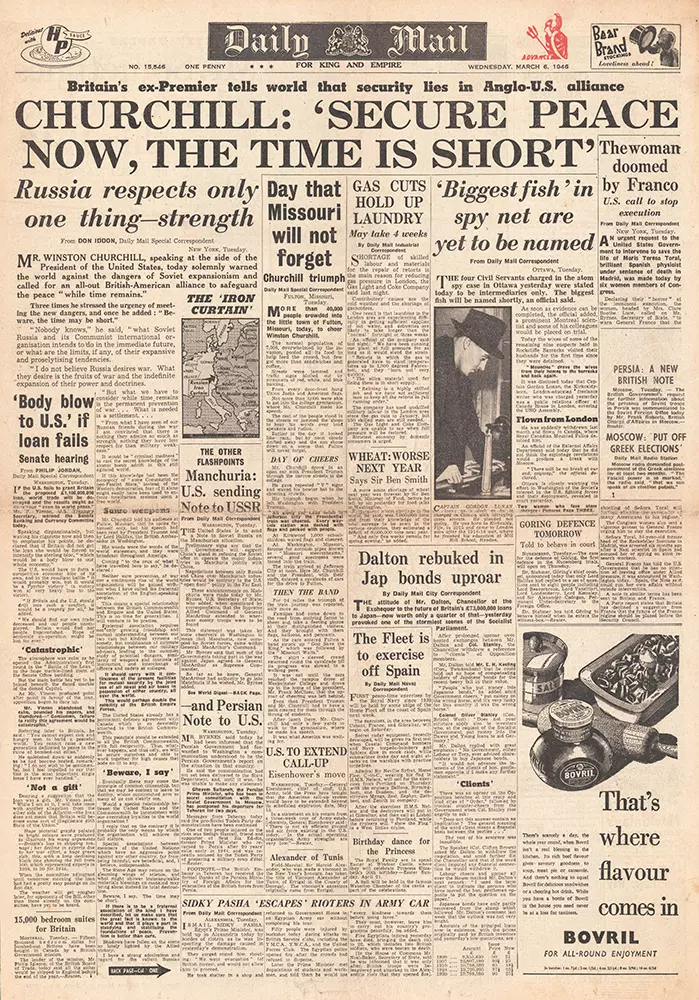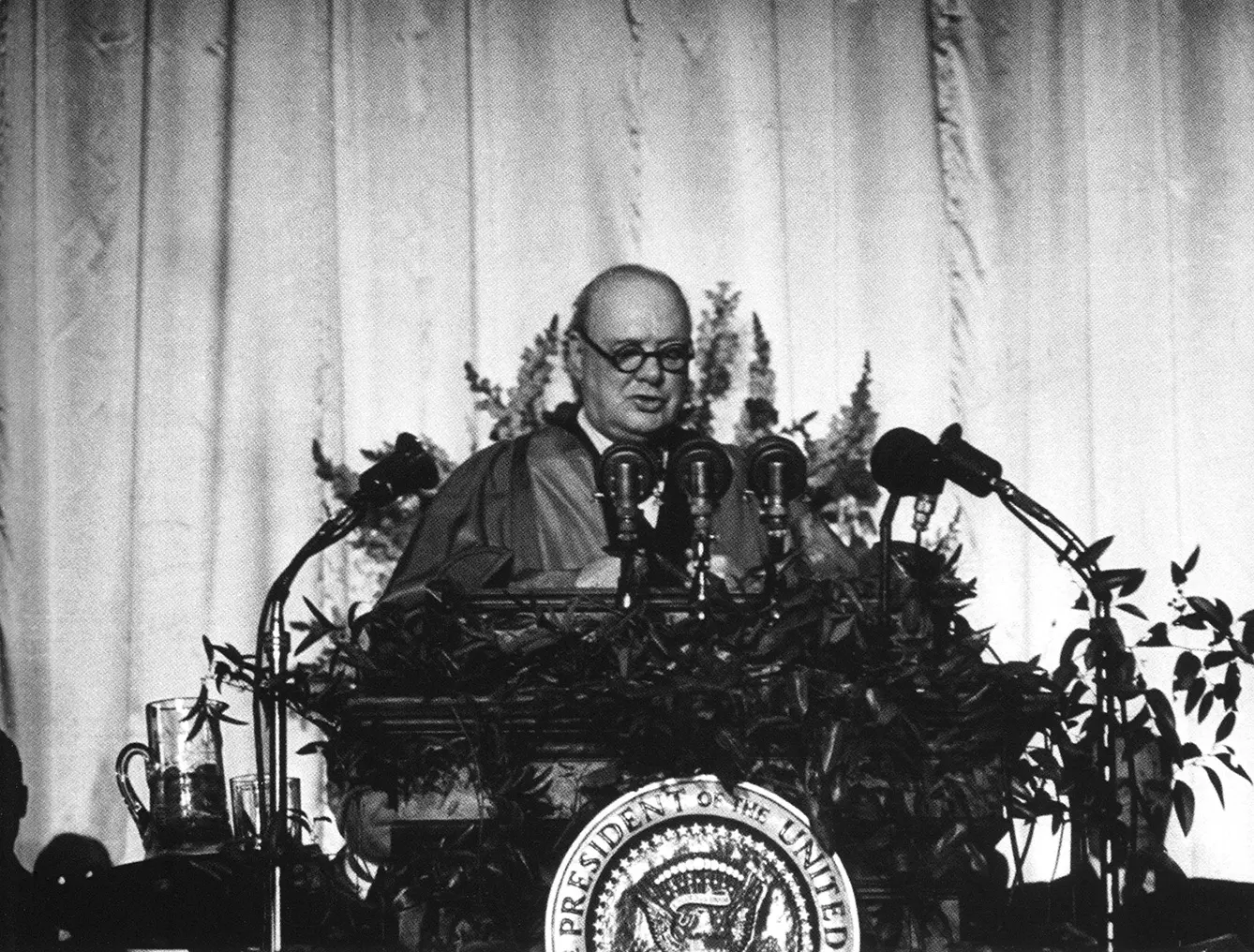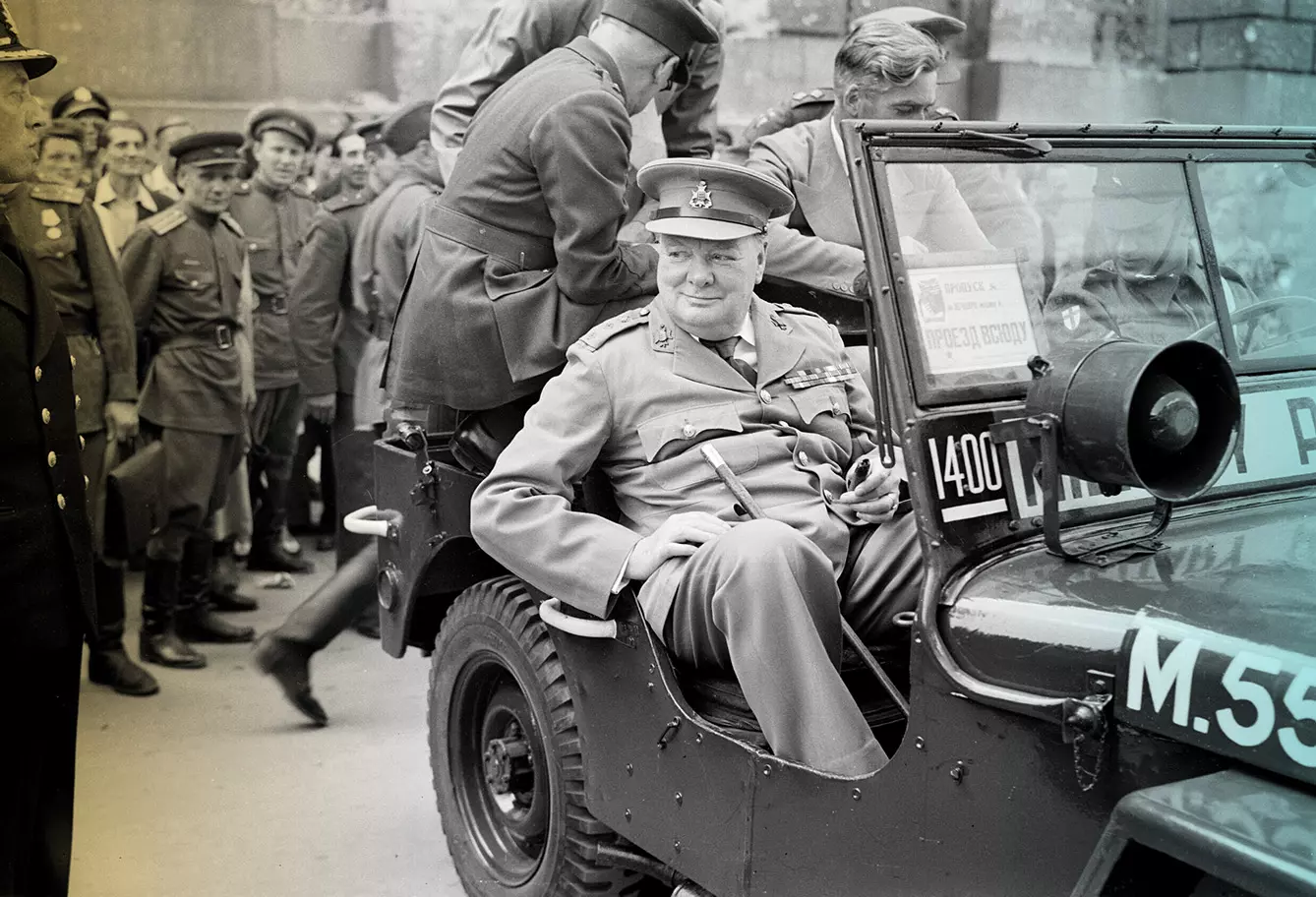When World War Two officially ended on 8 May 1945, Western Anglo-Saxon countries, namely the USA and Great Britain, were allied with the Soviet Union. But, as it soon turned out, the three emperors of the modern world were friends only officially. The course taken by the latter was growing divergent from those who were fighting for a more democratic world.
Winston Churchill: the artist formerly known as the Prime Minister
Much changed in the ensuing years. Winston Churchill wasn’t the Roaring Lion anymore – or at least not a roaring lion in power. Just after the war, the Labour Party took power in Great Britain, and Churchill became the minority leader. He was – and remained – popular, though. And he was remembered as a wartime commander and one of the leaders of the free world.
As such, he was awarded multiple titles, including the Honoris Causa doctorate from Westminster College in Fulton, Missouri. During this ceremony, he gave one of his most important lectures. Titled “The Sinews of Peace,” it is most widely known as “The Iron Curtain Speech.” It was the first time – the first official speech – when the world heard about the Iron Curtain. And what he was referring to was the division between the Communist East and the Democratic West.


“From Stettin in the Baltic to Trieste in the Adriatic, an iron curtain has descended across the Continent.”
Sir Winston Churchill, “The Sinews of Peace,” or the Iron Curtain Speech
He declared toward the end of his lecture, having discussed the opportunities and threats to the new world order. The year was 1946, and this day, 5 March, is sometimes used as a demarcation line between the wartime alliance of the West with the Soviet Union and the Cold War, which was to make the world go round for the next five decades.
It leaves little to wonder why the phrase soon took off. It would seem as though it were coined very meticulously by a statesman with high literary skills like Winston Churchill, the notable author of several other memorable speeches. Among them:
- “The Finest Hour” speech;
- “We shall fight on the beaches” speech;
- “Blood, toils, tears, and sweat” speech;
- “Never was so much owed by so many to so few” speech;
- And “The Tragedy of Europe” speech.
And for his books, he even won the Noble Prize. It’s perhaps a bit funny, if not ironic that the man to defeat Adolf Hitler won this prestigious prize not in peace but in the literature category.
Letter and speech: the ontology of the Iron Curtain
Yet, “Iron Curtain” was a term already present in discussions. Moreover, it’s not even sure if it was coined by Winston Churchill himself. Although the Fulton Speech was the Iron Curtain phrase’s “first public performance,” it was rehearsed as soon as May 1945 in a letter to his American counterpart, President Harry Truman.
An iron curtain is drawn down upon their front. We do not know what is going on behind. There seems little doubt that the whole of the region Lubeck-Trieste-Corfu will soon be completely in their hands. A broad band of many hundreds of miles of Russian-occupied territory will isolate us from Poland.…it would be open to the Russians in a very short time to advance if they chose, to the waters of the North Sea and the Atlantic.
Sir Winston Churchill to President Harry Truman, May 1945
In his later “Sinews of Peace” speech, the Iron Curtain was a demarcation line. And it really was a declaration of the Cold War, of sorts. Churchill was stating the fact that along the invisible frontline, on both sides of it, stand the two powers. They face each other as enemies but do not engage in open conflict.
But in the case of this previous mention, the iron curtain is just what it sounds like – an obstruction that obfuscates the clear view of the Soviet Union’s advances on the Eastern front. That sounds as if Churchill was already seeing the division that was coming. But it also serves as a report from the front.
Winston Churchill: the man who coined the term “Iron Curtain.” Or did he?
But even the letter to Truman was not the first time when the term ‘Iron Curtain’ first appeared. And, perhaps ironically, the words were first used by a Russian. In 1918, when the October Revolution was already happening, philosopher Vasily Rozanov published the book “The Apocalypse of Our Time.”
The titular Apocalypse was, in Rozanov’s opinion, the first two decades of the 20th century in Russia. Christian ideology failed to organize Western society and make life any easier, but the Russian Revolution didn’t make things any better. The October Revolution was not the beginning of something new and promising but a conclusion to decades of misery.
Russia faded away over two days (1917), three at the most. Even Novoe Vremia had been impossible to close down as quickly as it happened to Russia. The most amazing thing is that this country broke down at once, falling into the smallest of pieces. History has never experienced such a cataclysm, including even the Great Volkerwanderung at the end of antiquity, for it marked a whole epoch, and now everything happened in a couple of days. The Empire, Army, and Church were all gone. What, then, is left? Unbelievable but true: nothing.
Vasily Rozanov, “Apocalypse of Our Time”
Some consider it a prophecy of the next revolution in Russia when the Berlin Wall fell and the Iron Curtain, supposedly, along with it. And these words are the context for the first appearance of the phrase, later borrowed by Winston Churchill.
The Iron Curtain descended over Russian history with much noise, creaking, and screeching. The play was over, and people in the audience rose to collect their fur coats and go home. They looked around and saw neither their coats nor homes.
Vasily Rozanov, “Apocalypse of Our Time”
Was Churchill inspired by the text, or did he reinvent the term on his own? There is no evidence of him knowing of this essay. What we know, though, is that Sir Winston, a man of action, was also a man of words. His literary interests were broad, interested in both fiction and science fiction, and always up to date with the latest publications. And his literary ventures overlapped with his political activity – as his speeches clearly demonstrate.
On the other hand, after Rozanov, the phrase circulated, being used in “Through Bolshevik Russia” by Ethel Snowden and also by Joseph Goebbels in “Das Reich” in February 1945.
The speech that began the cold war
One thing we know for sure: there wouldn’t be any notion of the Iron Curtain now, after almost eighty years, if not for Churchill’s famous “Sinews of Peace,” more commonly known as the “Iron Curtain Speech” given at Westminster College, Fulton, Missouri.
His speech was called “The Sinews of Peace” for a reason. It was all about the new world order – the one forged by the victory of the allies. And the balance of power was definitely on the side of the USA and the Soviet Union. Reading the following, remember that Churchill was addressing the American elite:
I can, therefore, allow my mind, with the experience of a lifetime, to play over the problems which beset us on the ‘morrow of our absolute victory in arms, and to try to make sure with what strength I have that what has been gained with so much sacrifice and suffering shall be preserved for the future glory and safety of mankind.
The United States stands at this time at the pinnacle of world power. It is a solemn moment for American Democracy. For with primacy in power is also joined an awe-inspiring accountability to the future. If you look around you, you must feel not only the sense of duty done but also you must feel anxiety lest you fall below the level of achievement.
Sir Winston Churchill, “The Sinews of Peace,” or the Iron Curtain Speech
The proposals outlined here, the American “accountability for the future,” were already shaped – by Allied conferences in Tehran, Yalta, and Potsdam, or by new economic decisions in Bretton Woods.
And we all know the (basic) consequences. You don’t even need to be a skilled historian to know them: pop culture is filled with it. The English speaking free-world led by the USA vs. Communist regimes under the umbrella of the Soviet Union is the go-to plot in virtually every spy movie, from 1949’s The Third Man to 1995’s Golden Eye James Bond saga, set in the remnants of the Soviet empire.
Is Iron Curtain still there?
So, the remnants. Google the “new Iron Curtain,” and you’ll likely get dozens of thousands of results (including, hopefully, this one). There are new Iron Curtain propositions from The Guardian, Al Jazeera, and The New Statesman.
Russia’s war in Ukraine poses a grave threat to NATO’s eastern states. As Britain doubles its military presence in Estonia, the West is braced for conflict once again.
Jeremy Cliffe for The New Statesman
But the times, they have a-changed – following two NATO expansions to the East. The first, in 1999, included Poland, Czechia, and Hungary. The subsequent one – in 2004 – extended the pact to the Baltic Countries, Slovakia, and Romania, to name only those bordering the former USSR.
That’s why, based on Churchill’s Iron Curtain speech, The New Statesman’s author proclaimed the new division “from Murmansk in the Arctic to Istanbul on the Bosphorus.” New Statesman’s proposal is published in March 2022. The Russian war on Ukraine was by then in perhaps its second stage, stretching far beyond Putin’s intended “three-day-long special military operation.” But even the February invasion was preceded by months of military buildup on both sides of the NATO eastern border.
And before that were years of muscle- (or Churchill’s sinews-) -stretching, and Western sanctions against Russian annexations of independent nations’ territories. The tensions rose, then, on both sides of the border, and Russia, perhaps unsurprisingly, joined the narrative.
As far as an iron curtain is concerned, it’s practically already coming into place.
Russia’s Foreign Minister Sergey Lavrov
Is this a correct metaphor? It’s hard to say: comparing a statement from eight decades ago to words said this year is a classic apples-to-oranges situation. We can’t predict the long consequences of the contemporary situation as we can tell a lot about the historical one.
That said, in current Western-Russian relations, the most accurate meaning of the Iron Curtain is the one from Churchill’s letter to Truman: “We don’t know what’s going on behind.” Maybe, the other one will remain accurate as well: Rozanov’s notion of the Iron Curtain descending “over Russian history with much noise.” But that only time will tell.







